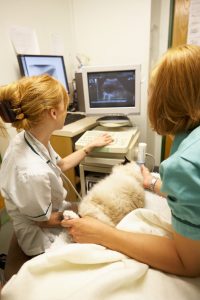 This article looks at what veterinary technicians (vet techs) do once they have completed their training, have qualified and have got their state license.
This article looks at what veterinary technicians (vet techs) do once they have completed their training, have qualified and have got their state license.
According to the US Bureau of Labor Statistics more than 90% of veterinary technicians work in private veterinary practices. So let’s look first at vet techs working in vet’s private practices.
Pet owners have ever greater expectations about what veterinarians (vets) can do to protect their pets and keep them healthy. In spite of recent economic difficulties the evidence shows that there is an ever growing demand for vet services. To respond to this many vets are making their practices more effective by employing highly skilled vet techs to provide professional support for themselves.
Vet techs provide many of the same services to vets which nurses provide to doctors, such as routine laboratory and clinical procedures. This work is always formally under the supervision of the vet who is ultimately responsible for everything the vet tech does.
Some of the typical tasks carried out by vet techs include:
- Administering anesthesia to animals, under the supervision of a vet
- Providing ongoing care for animals recovering from treatment
- Preparing and giving medicines, vaccines, and treatments, as prescribed by vets.
- Administering emergency first aid
- Carrying out blood tests, urine tests and feces tests to enable the vet to diagnose animal illnesses.
- Using x-ray and other radiological equipment
- Getting animals ready for surgery, such as by shaving parts of the animal in preparation for treatment.
- Preparing and labeling samples for laboratory testing
- Ensuring that the instruments are sterilized, and that the examination room is clean and ready for use
- Preparing drugs and anything else prescribed by the vet.
- Assisting the vet in physical examinations of animals such as by restraining animals when necessary, or taking the temperature of animals
- Maintaining laboratory, research, and treatment records.
- Ensuring that proper records are maintained in the practice
- Ensuring that all equipment is properly maintained
- Undertaking dental work such as cleaning, or extracting teeth.
- Maintaining good hygiene standards by cleaning out the mess left by animals in kennels, examination rooms and animal holding areas.
- Providing advice to pet owners on issues of animal health or nutrition
- Providing assistance with animal euthanasia and the disposal of remains.
- Undertaking various administrative tasks such as running the reception desk, receiving payments, or selling products.
- Cutting the hair of animals or clipping nails and claws.
- Training new members of the clinical team
Vet techs may also work in colleges, universities and professional schools, or in private industry in pet food companies or pharmaceutical companies, in other scientific and research establishments, or in animal welfare organizations. There may be a greater emphasis on academic research which may make the work especially appropriate for those who have completed the four year Bachelor of Science qualification.
This work may involve taking blood and urine samples, cross checking records of animal histories, analyzing samples in laboratories or by using microscopic equipment.
With the growing demand for veterinary services it is likely that there will be a demand for more and more vet techs in the coming years.
The answer to the question – “What does a vet tech do?” – is that it is a very varied job which is likely to grow in importance in the next few years.